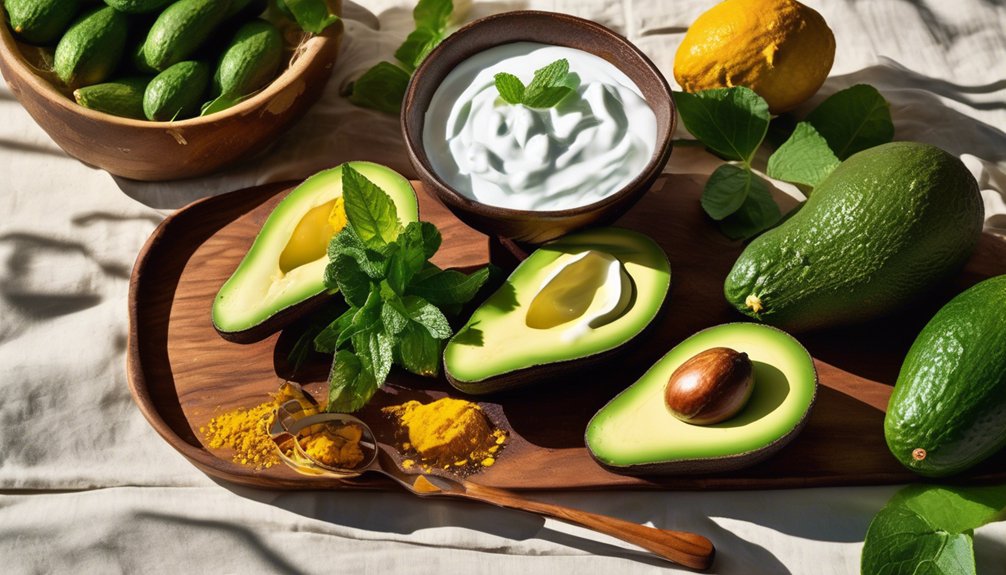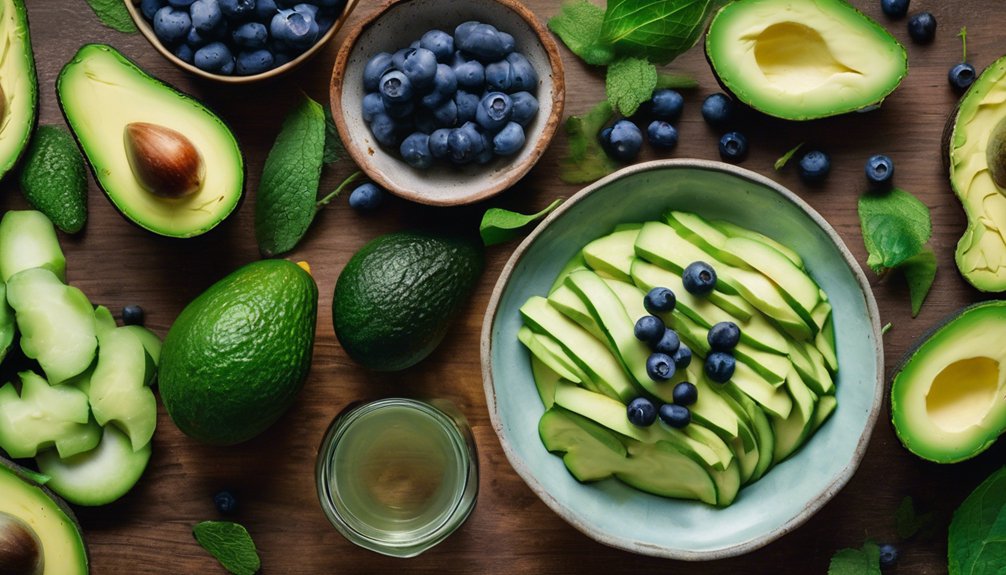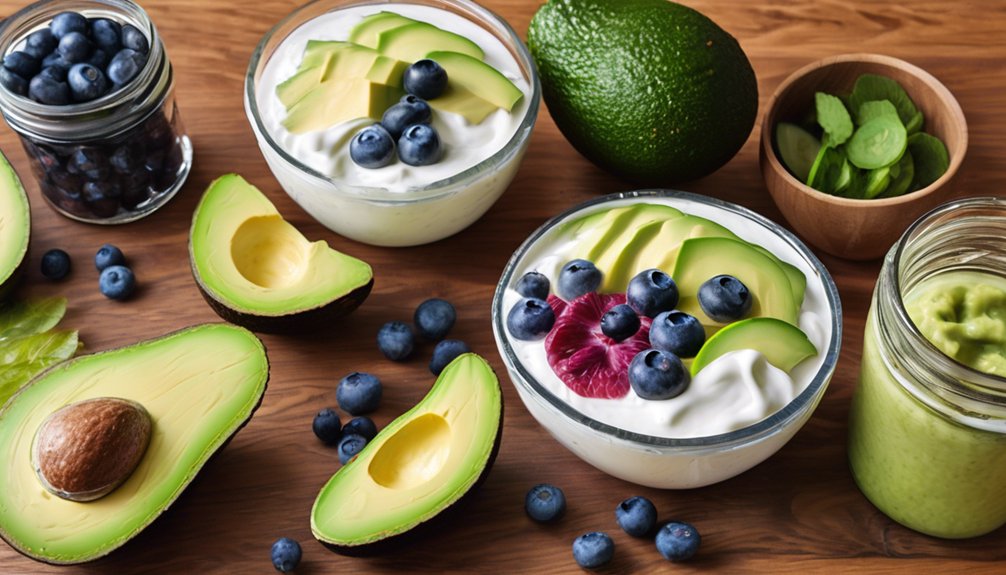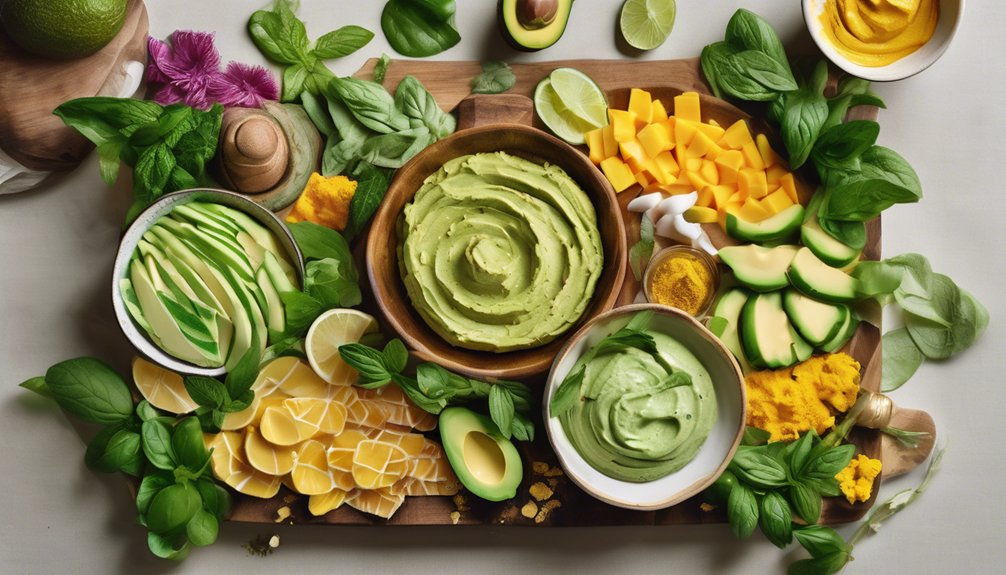Anti-Bloating Foods for Women
Did you know that certain foods can significantly reduce bloating and improve your digestive health? Many women experience discomfort, but incorporating specific anti-bloating foods into your diet can make a difference. From fiber-rich fruits to gut-friendly probiotics, these options not only alleviate symptoms but also support overall well-being. Curious about which foods can help you feel lighter and more comfortable? Let's explore some effective choices that could transform your digestion.
Key Takeaways
- Incorporate fiber-rich fruits like pears, apples, and berries to promote healthy digestion and reduce bloating.
- Include gut-friendly probiotics such as yogurt and kefir to balance gut flora and alleviate gas.
- Hydrating foods like cucumber and watermelon help flush out excess sodium and ease discomfort.
- Use anti-inflammatory spices like turmeric and ginger in meals to support digestion and calm the gut.
- Stay hydrated with water and herbal teas to enhance overall digestive health and minimize bloating.
The Importance of Digestive Health for Women
When it comes to overall well-being, digestive health plays a crucial role for women, influencing everything from energy levels to emotional stability.
Your body relies on digestive enzymes to break down food and absorb nutrients effectively. When your digestive system functions properly, it supports hormonal balance, ensuring that your hormones are in sync and functioning optimally. This balance can alleviate mood swings and enhance your overall sense of well-being.
If you're experiencing digestive issues, it can lead to fatigue and irritability, affecting both your physical and emotional health.
Prioritizing digestive health isn't just about avoiding discomfort; it's about nurturing a foundation for vibrant living. By focusing on your digestive well-being, you empower yourself to thrive in every aspect of life.
Fiber-Rich Fruits to Combat Bloating
Maintaining digestive health can significantly impact how you feel, especially when it comes to bloating. Incorporating fiber-rich fruits into your diet is an effective way to tackle this issue.
Fruits like pears, apples, and berries are excellent fiber sources that promote healthy digestion. These fruit varieties not only help keep things moving in your gut but also add essential vitamins and antioxidants to your meals.
Eating these fruits can increase your fiber intake, reducing the chances of constipation and bloating. You might also consider adding bananas, which contain pectin, a type of soluble fiber that aids digestion.
Gut-Friendly Probiotics and Their Benefits
Incorporating gut-friendly probiotics into your routine can transform your digestive health and help alleviate bloating. These beneficial bacteria balance your gut flora, promoting better digestion and nutrient absorption. You'll find probiotic sources in foods like yogurt, kefir, sauerkraut, and kombucha.
Regularly consuming these delights can enhance your gut's ecosystem, reducing gas and discomfort.
Research shows that a healthy gut flora can also support your immune system and even improve mood. So, not only will you feel lighter, but you might also find yourself feeling a bit happier.
Hydrating Foods That Help Reduce Bloating
While many factors contribute to bloating, incorporating hydrating foods into your diet can significantly ease discomfort. These foods not only help you stay hydrated but also promote digestive health.
Here are four hydrating options you should try:
- Cucumber slices – Crisp and refreshing, they're low in calories and high in water content.
- Watermelon wedges – Sweet and juicy, they're packed with water and can help flush out excess sodium.
- Celery sticks – Crunchy and hydrating, they're great for snacking and can ease bloating.
- Zucchini – Versatile and hydrating, you can enjoy it grilled, spiralized, or in salads.
Incorporating these foods into your meals can help you feel lighter and more comfortable throughout the day.
Anti-Inflammatory Spices for a Calmer Gut
If you want to soothe your digestive system and reduce bloating, adding anti-inflammatory spices to your diet can be a game-changer. Turmeric, rich in curcumin, has impressive benefits, including reducing inflammation and aiding digestion. Ginger tea is another fantastic option, known for calming the gut and relieving nausea.
Here's a quick look at some powerful spices:
| Spice | Benefits | How to Use |
|---|---|---|
| Turmeric | Reduces inflammation, aids digestion | Add to smoothies or curries |
| Ginger | Soothes nausea, calms the gut | Brew as a tea or add to stir-fries |
| Cinnamon | Regulates blood sugar, anti-inflammatory | Sprinkle on oatmeal or yogurt |
| Cayenne | Boosts metabolism, aids digestion | Use in savory dishes or sauces |
Incorporate these spices into your meals, and you'll likely find a calmer gut.
Whole Grains and Their Role in Digestion
Whole grains play a vital role in digestion, offering numerous benefits that can help reduce bloating and promote gut health. By incorporating whole grains into your diet, you can support your digestive enzymes and enhance overall wellness.
Here are some whole grain benefits you might enjoy:
- High Fiber Content: Promotes regular bowel movements and keeps you feeling full.
- Prebiotic Properties: Nourishes beneficial gut bacteria, aiding in digestion.
- Reduced Inflammation: Whole grains can help lower gut inflammation, minimizing bloating.
- Balanced Blood Sugar: They help stabilize your blood sugar levels, reducing cravings and digestive stress.
Embracing whole grains can transform your relationship with food, making you feel lighter and more energized.
It's a simple yet effective way to nurture your gut health.
The Power of Leafy Greens for Flatulence Relief
Leafy greens are a powerhouse for combating flatulence and promoting digestive comfort. Packed with fiber, they help regulate your digestive system and reduce gas buildup.
Spinach, kale, and arugula aren't just nutrient-dense; they also contain enzymes that support digestion, making them ideal for flatulence relief. When you incorporate these greens into your meals, you're not only adding vibrant flavors but also nurturing your gut health.
Try tossing some sautéed greens into your pasta or blending them into a smoothie. You'll find that including leafy greens in your diet can lead to a happier tummy.
Herbal Teas That Soothe the Stomach
When it comes to soothing an unsettled stomach, herbal teas can be your best friend.
These comforting brews offer a range of herbal benefits, helping you relax and ease discomfort. Here are four soothing blends to try:
- Peppermint Tea: Known for its calming properties, it helps relieve gas and bloating.
- Ginger Tea: This spicy root promotes digestion and alleviates nausea, making it a go-to for many.
- Chamomile Tea: With its gentle sedative effects, chamomile can relax your digestive muscles and reduce bloating.
- Fennel Tea: Fennel seeds are excellent for reducing gas and inflammation.
Incorporating these herbal teas into your routine can transform your approach to comfort, providing a warm, soothing remedy for your stomach woes.
Incorporating Fermented Foods Into Your Diet
Incorporating fermented foods into your diet can significantly enhance your digestive health, especially for women experiencing bloating. These foods, rich in probiotics, help restore the balance of gut bacteria, promoting a healthier digestive system.
Start by adding fermented vegetables like sauerkraut and kimchi to your meals—they're not only tasty but also packed with beneficial bacteria. You might also enjoy probiotic beverages such as kombucha or kefir, which can further support your gut health.
Simple Recipes to Enjoy Anti-Bloating Foods
As you explore ways to combat bloating, simple recipes featuring anti-bloating foods can make a significant difference in your daily diet. Here are some easy options to get you started:
- Bloating Smoothies: Blend ripe bananas, spinach, and ginger with almond milk for a refreshing drink.
- Digestive Soups: Simmer zucchini, carrots, and fennel in vegetable broth for a soothing bowl of goodness.
- Cucumber Salad: Toss sliced cucumbers with lemon juice and mint for a hydrating side.
- Quinoa Bowl: Mix cooked quinoa with steamed broccoli and a drizzle of olive oil for a hearty meal.
These recipes not only taste great but also help soothe your digestive system, making you feel lighter and more comfortable throughout the day. Enjoy!
Frequently Asked Questions
Can Stress Contribute to Bloating and Digestive Issues?
Yes, stress can definitely contribute to bloating and digestive issues. By practicing stress management techniques, you can enhance your digestive wellness, helping your body function better and reducing discomfort. Prioritizing relaxation makes a difference!
Are There Specific Foods to Avoid for Bloating Relief?
You wouldn't believe how much gas-producing foods can wreak havoc on your digestive system! To find relief, consider avoiding high fiber intake from beans, lentils, and cruciferous veggies that can leave you feeling bloated and uncomfortable.
How Can Hormonal Changes Affect Bloating in Women?
Hormonal fluctuations during your menstrual cycle can lead to water retention and digestive changes, making you feel bloated. Understanding these shifts helps you manage symptoms and feel more comfortable throughout your cycle, enhancing your overall well-being.
Is Bloating a Sign of a More Serious Health Issue?
Bloating's like a storm brewing in your belly; while it often stems from diet or stress, underlying health implications shouldn't be ignored. If persistent, consider consulting a doctor to rule out serious bloating causes.
How Long Does It Take to See Results From Anti-Bloating Foods?
When you make dietary adjustments, you might notice changes in your bloating timeline within a few days to a week. Consistency is key, so stick with it and listen to your body's responses.
Conclusion
By incorporating these anti-bloating foods into your daily meals, you're taking a vital step toward better digestive health. Imagine feeling lighter and more energized, free from the discomfort that can hold you back. What if the secret to your well-being lies in the simple choices you make at mealtime? Don't underestimate the power of fiber-rich fruits, hydrating veggies, and soothing spices. Start experimenting today, and uncover the relief you've been searching for—your gut will thank you!











